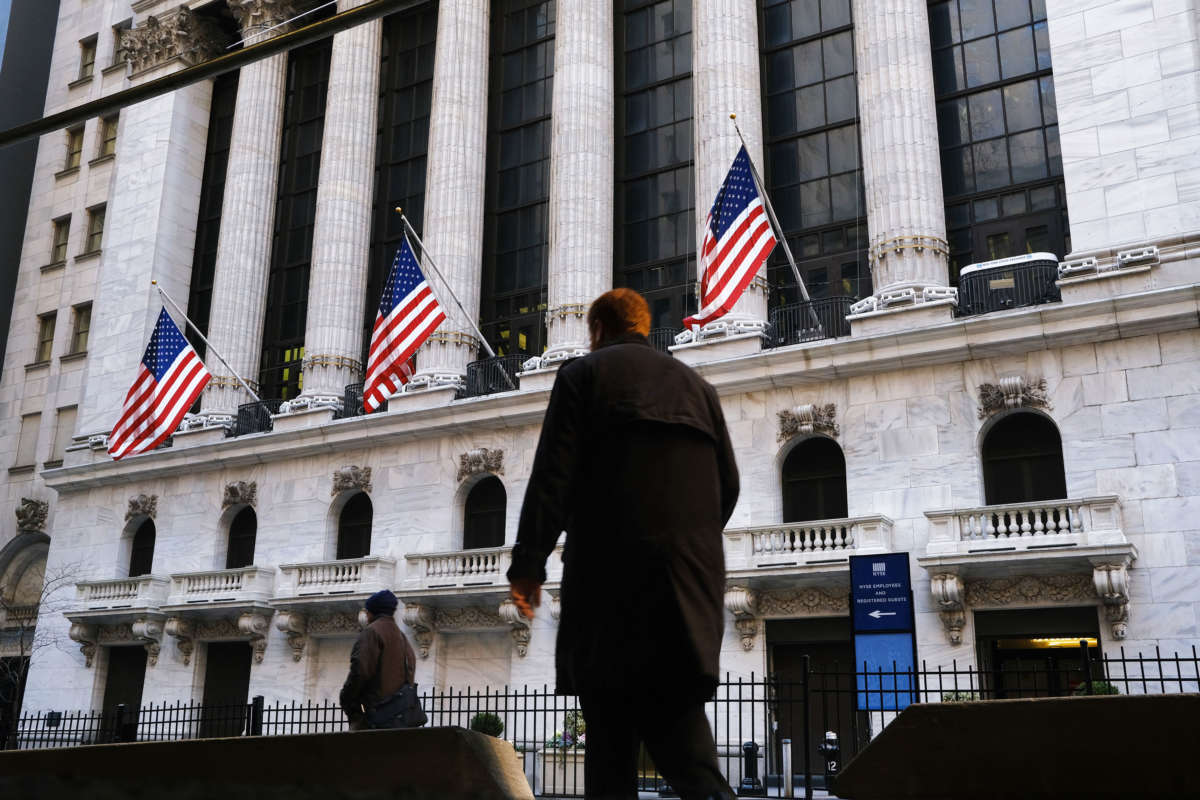Did you know that Truthout is a nonprofit and independently funded by readers like you? If you value what we do, please support our work with a donation.
The 2010 landmark ruling in Citizens United amplified the influence of deep-pocketed Wall Street stockbrokers and private investors in federal politics and rewarded them with greater political purchasing power.
The securities and investment industry gave more to outside spending groups than any other industry in each of the last four full election cycles. As big money continues to take advantage of current campaign finance regulations, the financial industry remains at the top as the 2020 election gets underway.
Since 2012, the industry has contributed at least $80 million to outside groups in every cycle, more than half of that coming from a small group of individuals. Before the Supreme Court decision, the industry never spent more than $17.8 million in any election cycle.
The ruling in Citizens United allowed corporations and labor unions to spend unlimited sums on independent expenditures. Most major corporations have not taken advantage of their increased abilities since the ruling, but ultra-wealthy political insiders give multi-million gifts to outside groups born out of the ruling such as super PACs.
Campaign finance reformers have criticized the ruling for giving wealthy elites more influence over elections that cater to their personal issues, rather than focusing on issues that are relevant to working-class voters who represent the majority of the electorate.
In 2016, investors and hedge fund managers gave nearly $350 million to outside groups. Big money contributions from wealthy individuals are more important than ever, especially at the presidential level, and it’s not surprising that Wall Street investors who have million-dollar incomes are at the top of the pack, according to Michael Kang, professor of law at Northwestern University.
“Wall Street thinks it’s important to influence politics, to have the right policy makers for them to make the money that they are accustomed to making,” Kang said.
Over the last decade, a consistent group of wealthy investors contributed to outside groups, including George Soros of Soros Fund Management, Ken Griffin of Citadel and Stephen Schwarzman of Blackstone Group. The list of wealthy donors also includes Democratic presidential candidates Mike Bloomberg and Tom Steyer, who made their billions in the investment industry.
Donald Sussman of Paloma Partners contributed more than $39 million to outside groups during the 2016 election cycle alone. At the hedge fund Renaissance Technologies, billionaire James Simons gave around $25 million to liberal groups while his former coworker Robert Mercer gave more than $22 million to conservative groups.
Typically, big-dollar donors stick with either liberal or conservative groups, and don’t donate to both camps.
Citizens United laid the foundation to open up avenues for big money contributions. SpeechNow.org v. Federal Election Commission, which led to the creation of super PACs, broke psychological barriers for wealthy people to contribute more money to influence federal elections, according to Richard Hasen, a professor of law at the University of California-Irvine.
In the 2008 election cycle, the industries that contributed the most to outside groups were public sector unions, miscellaneous unions, and pharmaceuticals. During that year, labor groups contributed $54 million, which accounted for more than half of outside spending for that election cycle.
Without officially coordinating with candidates, outside spending groups such as super PACs and nonprofits influence elections through ads and other forms of media. Since Citizens United, outside groups outspent the candidates in 126 races, effectively becoming substitutes for candidate campaigns.
Even though major donors and candidates are not allowed to collaborate, there is often a level of coordination between the two, allowing candidates to ensure big money support or prevent ultra-rich donors from actively opposing them, Kang said.
“It’s less than quid pro quo, but it’s more how candidates position themselves, knowing that donors have certain preferences and how you position yourself is going to change the way that donors perceive you,” Kang said.
Kang said wealthy donors and other political insiders often have candidates they support or oppose go through invisible, private primaries that happen behind closed doors to cater to their personal, narrow ideologies.
Hasen said wealthy donors have a unique set of issues that people in other socioeconomic classes typically don’t share. Through loopholes in funding of public policy, a donor can influence change that is significant to their industry, but not important or noticeable to working-class voters, he said.
After a candidate is elected, mega-donors look to influence public policy, which occurs fairly regularly in politics, according to Hasen.
Hasen anticipates campaign finance concerns about mega-donors will only be exacerbated in the 2020 presidential election. He does not see big money contributions slowing down within the next 10 years.
So far in 2020, the securities and investment industry contributed $32 million to outside groups, more than any other industry. That number is expected to increase dramatically as the election year continues.
Media that fights fascism
Truthout is funded almost entirely by readers — that’s why we can speak truth to power and cut against the mainstream narrative. But independent journalists at Truthout face mounting political repression under Trump.
We rely on your support to survive McCarthyist censorship. Please make a tax-deductible one-time or monthly donation.
